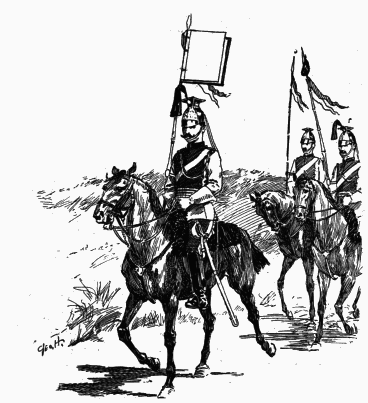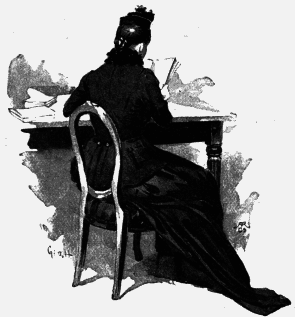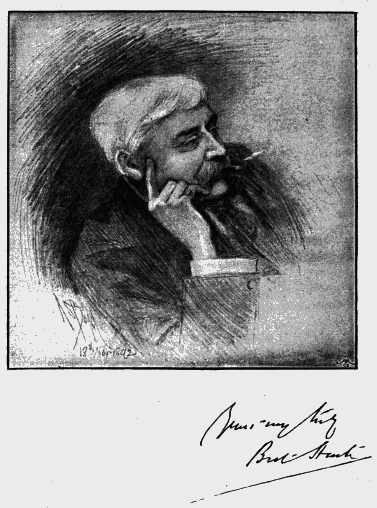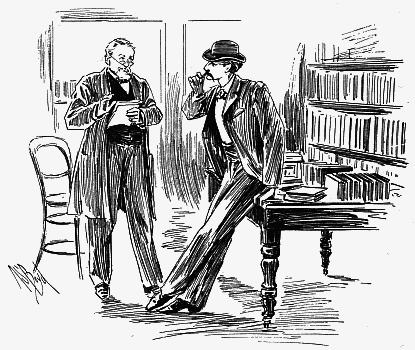My First Book, стр. 43
Then arose a long haggle over terms, which I had thought were settled, and to be on the same terms as the magazine rates—no such wonderful scale after all. However, my literary guide, philosopher, and friend thought, as he was doing me the inestimable service of bringing me out, that 20l. was an ample honorarium for myself; but I, being young and poor, did not see things in the same light at all. Try as I would—and I cannot lay claim to trying very hard—I could not see why a man, who had never seen me, should have put himself to so much trouble out of a spirit of pure philanthropy, and a desire to help a struggling young author forward. So I obstinately kept to my point, and said if I did not have 30l., I would rather have all of the stories back again. I think nobody would credit to-day what that special bit of firmness cost me. Still, I would cheerfully have died before I would have given in, having once conceived my claim to be a just one. A bad habit on the whole, and one that has since cost me dear more than once.

Eventually, my guide and I came to terms for the sum for which I had held out, namely, 30l., which was the price I received for my very first book, in addition to about 8l. that I had already had from the magazine for serial use of a few of the stories.
So, in due course, my book, under the title of 'Cavalry Life,' was brought out in two great cumbersome volumes by Messrs. Chatto & Windus, and I was launched upon the world as a full-blown author under the name of 'Winter.'
So many people have asked me why I took that name, and how I came to think of it, that it will not, perhaps, be amiss if I give the reason in this paper. It happened like this. During our negotiations, my guide suggested that I had better take some nom de guerre, as it would never do to bring out such a book under a woman's name. 'Make it as real-sounding and non-committing as you can,' he wrote, and so, after much cogitation and cudgelling of my brains, I chose the name of the hero of the only story of the series which was written in the first person, and called myself J. S. Winter. I believe that 'Cavalry Life' was published on the last day of 1881.
Then followed the most trying time of all—that of waiting to see what the Press would say of this, my first child, which had been so long in coming to life, and had been chopped and changed, bundled from pillar to post, until my heart was almost worn out before ever it saw the light. Then, on January 14, 1882, I went into the Subscription Library at York, where I was living, and began to search the new journals through, in but faint hopes, however, of seeing a review of my book so soon as that; for I was quite alone in the world, so far as literary matters went. Indeed, not one friend did I possess who could in any way influence my career, or obtain the slightest favour for me.
I remember that morning so well; it is, I think, printed on my memory as the word 'Calais' was on the heart of Queen Mary. It was a fine, cold morning, and there was a blazing fire in the inner room, where the reviews were kept. I sat down at the table, and took up the Saturday Review, never dreaming for a moment that I should be honoured by so much as a mention in a journal which I held in such awe and respect. And as I turned over the leaves, my eyes fell on a row of foot-notes at the bottom of the page, giving the names of the books which were noticed above, and among them I saw—'Cavalry Life, by J. S. Winter.'
For full ten minutes I sat there, feeling sick and more fit to die than anything else. I was perfectly incapable of looking at the notice above. But, at last, I plucked up courage to meet my fate, very much as one summons up courage to have a tooth out and get the horrid wrench over. Judge of my surprise and joy when, on reading the notice, I found that the Saturday had given me a rattling good notice, praising the new author heartily and without stint. I shall never, as long as I live, forget the effect of that, my first review, upon me. For quite half an hour I sat without moving, only feeling, 'I shall never be able to keep it up. I shall never be able to follow it up by another.' I felt paralysed, faint, crushed, anything but elated and jubilant. And, at last, through some instinct, I put my hand up to my head to find that it was cold and wet, as if it had been dipped in the river. Thank Heaven, from that day to this I have never known what a cold sweat was. It was my first experience of such a thing, and sincerely I hope it will be my last.

'CALIFORNIAN VERSE'
By Bret Harte

WHEN I say that my 'first book' was not my own, and contained beyond the title-page not one word of my own composition, I trust that I shall not be accused of trifling with paradox, or tardily unbosoming myself of youthful plagiary. But the fact remains that in priority of publication the first book for which I became responsible, and which probably provoked more criticism than anything I have written since, was a small compilation of Californian poems indited by other hands.
A well-known bookseller of San Francisco one day handed me a collection of certain poems which had already appeared in Pacific Coast magazines and newspapers, with the request that I should, if possible, secure further additions to them, and then make a selection of those which I considered the most notable and characteristic for a single volume to be issued by him. I have reason to believe that this unfortunate man was actuated by a laudable desire to publish a pretty Californian book—his first essay in publication—and at the same time to foster Eastern immigration by an exhibit of the Californian literary product, but, looking back upon his venture, I am inclined to think that the little volume never contained anything more poetically pathetic or touchingly imaginative than that gentle conception. Equally simple and trustful was his selection of myself as compiler. It was based somewhat, I think, upon the fact that 'the artless Helicon' I boasted 'was Youth,' but I imagine it was chiefly owing to the circumstance that I had from the outset, with precocious foresight, confided to him my intention of not putting any of my own verses in the volume. Publishers are appreciative; and a self-abnegation so sublime, to say nothing of its security, was not without its effect.

We settled to our work with fatuous self-complacency, and no suspicion of the trouble in store for us, or the storm that was to presently hurtle around our devoted heads. I winnowed the poems, and he exploited a preliminary announcement to an eager and waiting Press, and we moved together unwittingly to our doom. I remember to have been early struck with the quantity of material coming in—evidently the result of some popular misunderstanding of the announcement. I found myself in daily and hourly receipt of sere and yellow fragments, originally torn from some dead and gone newspaper, creased and seamed from long folding in wallet or pocket-book. Need I say that most of them were of an emotional or didactic nature; need I add any criticism of these homely souvenirs, often discoloured by the morning coffee, the evening tobacco, or, Heaven knows! perhaps blotted by too easy tears! Enough that I knew now what had become of those original but never re-copied verses which filled the 'Poet's Corner' of every country newspaper on the coast. I knew now the genesis of every didactic verse that 'coldly furnished forth the marriage table' in the announcement of weddings in the rural Press. I knew now who had read—and possibly indited—the dreary hic jacets of the dead in their mourning columns. I knew now why certain letters of the alphabet had been more tenderly considered than others, and affectionately addressed. I knew the meaning of the 'Lines to Her who can best understand them,' and I knew that they had been understood. The morning's post buried my table beneath these withered leaves of posthumous passion. They lay there like the pathetic nosegays of quickly-fading wild flowers, gathered by school children, inconsistently abandoned upon roadsides, or as inconsistently treasured as limp and flabby superstitions in their desks. The chill wind from the Bay blowing in at my window seemed to rustle them into sad articulate appeal. I remember that when one of them was whisked from the window by a stronger gust than usual, and was attaining a circulation it had never known before, I ran a block or two to recover it. I was young then, and in an exalted sense of editorial responsibility which I have since survived, I think I turned pale at the thought that the reputation of some unknown genius might have thus been swept out and swallowed by the all-absorbing sea.
